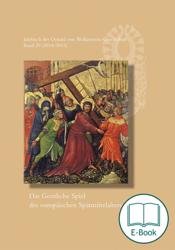In recent years, the presentation and communication of contents of faith that are valuable to create identities through the audio-visual media of theatre, at a time when there was hardly any other kind of ‘mass media’, has received increasing attention. The present volume, which collects the results of a symposium of the Oswald von Wolkenstein-Society, draws conclusions from current scholarship dealing with religious plays, and it extends the results by using a distinctively interdisciplinary perspective. The papers consider media, performance and language aspects of the plays as well as their social, institutional, regional, and religious or political contexts.
Recent developments in global politics demonstrate how influential audio-visual media are, especially in communicating religious contents and in founding group identities: Before the time of modern mass media theatre played the most important role in this context. This might be a reason why medieval and early modern religious plays recently attract much attention in cultural studies: Theatre can suggest evaluations, and convictions, it can create images of the foreign or the common. The present volume, which collects the results of a symposium of the Oswald von Wolkenstein-Society on religious plays in European Late Middle Ages in Admont, 2013, draws conclusions from current scholarship dealing with religious plays, and it extends the results by using a distinctively interdisciplinary perspective. The contributions by scholars of literature, language, theatre, music and art history consider media and performance aspects of the plays, manuscripts and illustrations, and they ask about the impact of language and rhetoric. They search for indications of the medieval audience’s attitude and attention, and they analyze the reaction of today’s audiences to the re-staging of medieval plays. The papers pay attention to social and political contexts of both the play texts and the performances, and to local traditions of literature, theatre and lay piety. Finally, the volume also treats the question of theatre’s role within interreligious conflicts and 16th century inter-confessional debate. Scholars involved in the volume: Roman Reisinger, Aneta Bialecka, Reinhard Hahn, Klaus Wolf, Johannes Janota, Verena Linseis, Stefan Engels, Stefan Morent, Glenn Ehrstine, Ursula Schulze, Winfried Frey, Franz Karl Praßl, Andrea Grafetstätter, Sandra Désirée Theiß, Simone Loleit, Andrea Moshövel, André Schnyder, Christian Neuhuber, Elke Ukena-Best, Cornelia Herberichs, Andrea Hofmeister-Winter, Irma Trattner, Peter Andersen-Vinilandicus, Martin Fischer, Galina Baeva, Klaus Amann, Johann Tomaschek, Danielle Buschinger, Cora Dietl, Regina Toepfer, Johanna Thali, Ursula Röper, Hans Jürgen Scheuer, Günther Jontes.
Wernfried Hofmeister ( b . 1956) was appointed Professor in Germanic Medieval Studies at the Karl-Franzens-University in Graz after his habilitation for German Language and Older German Literature in 1995. His teaching and research interests comprise— embedded in questions of scholarly edition—the regional literature of medieval Styria, the late medieval authors Hugo von Montfort and Oswald von Wolkenstein and generally Era overarching themes resp. Motifs of literature, culture, and linguistics. As head of the archive of the Oswald von Wolkenstein-Gesellschaft in Graz he runs as a board member of this association and since 2014 he acts as chairman of the Committee on the Middle Ages and Early Modern Times of the Arbeitsgemeinschaft für Germanistische Edition.
Cora Dietl (b. 1967) received her degrees as Dr. phil. and Dr. phil. habil. at the University of Giessen, with a thesis on German courtly romance, and early humanist Drama in South West Germany respectively. Since 2006, she holds the chair for the history of German literature at the University of Giessen. Her major fields of research are Arthurian literature, and late medieval and early modern theatre. In 2013 she was appointed international president of the Société internationale pour l’étude du théâtre médiéval, and from 2007–15 she was treasurer of the Oswald von Wolkenstein-Society.


 Sample
Sample